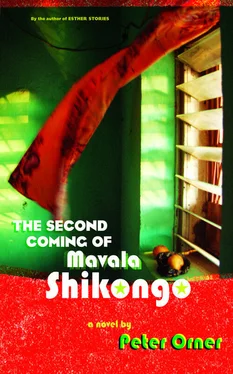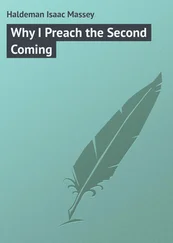Morning, cusp of the first ring of the triangle. I groggle over to the tap and nothing happens. I knock on Pohamba’s wall. “There’s no water.”
“None?”
“Check your tap.”
He checks his tap. “There’s no water.”
Through the wall, Vilho calls, “There’s no water.”
“We’re a chorus,” Pohamba says. “Let’s all sing. There’s no — ”
“It’s the drought,” Vilho says. “The water levels in the dams —”
Pohamba groans. “How are we going to have coffee?”
“I’ll eat it dry out of the can,” I say.
“Theofilus!” Pohamba shouts. “Theofilus!”
It came out later in the day that Theofilus had diverted our drinking water to try to save the cows. It was such a brazen act of love, he wasn’t even called to task for it by either the principal or the priest (who was gone to Swakop during the crisis). The principal finally had to call the municipality in Karibib, and the town council arranged for a water truck to come out to the farm. We had a holiday drinking water and spraying each other with the hose attached to the truck. For a week, nobody bathed. The classrooms got a little rank, but it was all right. You got to know other people better. You got to know yourself better. Being from Ohio, I have always thought of death as something cold. The bones of my grandfather in the cemetery in Walnut Hills in February, the snow falling lightly on his chiseled name. No longer.
*
It made for days of stink by the graves. Together we were festering. Not only the sand and pebbles that clung to us, but everything. Naked, we wore loose change, buttons, peanut shells, toenail clippings.
“Teacher, you smell malodorous.”
“I smell malodorous?”
There was cause for minor celebration. Auntie collapsed in the heat while trying to pry a hubcap off the principal’s car. It was three in the afternoon. Festus saw her flop over face-first in the sand. He waited for her to twitch. When she didn’t, he ran around the farm telling everybody she was dead. She wasn’t. Theofilus drove her to the clinic at Usakos to be examined. Why hadn’t she thought of this before? Clean sheets and pills and male orderlies? Why live anywhere else?
Her whelps suffered for it. They started roaming like the pack of wolves they almost were, living off our garbage — emptied pilchard cans, the last bit of dust at the bottom of a box of dried milk. Antoinette began leaving them scraps at the back of the hostel dining hall. They had mottled, thorn-bitten fur and sorrowful eyes. They no longer came close enough to allow us to pet them, as if the absence of Auntie had ended their official association with human hands. At night they’d yowl for their lost mother, who’d stolen them and pampered them, who’d shampooed them and fed them rotten hamburger. The whelps looked so much alike, they were always nameless to us — Antoinette called them her starvelings — but somebody remembered they did have names, names like Shaka and Beethoven and Rasputin. The too-well-endowed one with his eye gouged out she called Houdini. They didn’t live up to their names. They weren’t nearly so bold as their benefactor, and they didn’t steal, which surprised us. They’d only creep slowly, reticently, as if they didn’t want to bother anybody with their hunger.
“If that woman doesn’t come back,” Antoinette said, “we’ll have to drown them.”
“In what water?” Obadiah said.
She unbuttons and rebuttons her shirt as she talks. She’s been talking since the beginning of our hour.
“I wasn’t the only young mother in the camp. There were others. I remember thinking how calm they seemed. Nursing and cooing. I never gained it. I could teach myself so many other things. But that beautiful mothering. So I told myself they were cows.”
“Cows,” I repeat.
She sits up and looks at me. What was I doing in the sand with her? Goas is still asleep, but it’s that time when you can feel the silence about to be trampled.
“Are you calm now?”
“No,” she says.
I listen to her breathing, to her hand piling and smoothing the gravel. Leaning against Grieta’s grave, we don’t face the mountains, only the scorched plain, the rocks, the dry tufts bent to the wind. I reach for her. She uncoils slowly toward me.
He leans against the wall outside his room. He’s marking homework assignments. Long division. His red pen flinging. He had little tolerance for messy papers and would sometimes mark off for it even if they got the answer right. His shadow plump and flattened next to him, squashed by the angle of the early-afternoon sun. His door is held open by a brick, but in this glare you can see nothing of his room but a hole in the dark. He stops his pen for a moment and stares out at the veld. As if it isn’t distance but time he’s looking at. His shoulder blades tense. Not his, this parch. His place is Otavi, where it always rains at least twice after the fifteenth of February. He takes up the pen again and continues to slash.
And still nothing happens here. We walk the veld and the dry puckerthorns explode beneath our feet. Where the dead grass has gusted away, there are deep fissures in the dirt. The sun squashes and the weeks pass flat. And then an occurrence: Obadiah loses his TransNamib hat. A farmwide search has yielded no suspects. Standard Sevens, under heavy questioning, deny any involvement. Then, off the radio, still more news. Gorbachev’s been murdered. An hour later he’s resurrected, but now imprisoned on treason charges, in his dacha, in the Crimea. The BBC intones: All seven phone lines leading into the vacation house are reported to have been cut .
And somebody named Gennady Yanayev declares a renewal of Soviet proletarian fortunes.
“Sounds like a putsch.”
“Tasty putsch?” Pohamba says.
“Yanayev? Who the hell’s Yanayev?”
And Obadiah sermonizes, hatless, during mid-morning break: “Wherefore I ask: Who will deliver our Daniel from the ferocity of the lions?”
Empires keel. And still the goats come in from the veld on wobbly legs, and still they don’t know they’re starving.
It is said that goats eventually go mad. When this happens, they refuse to obey their shepherd and flee to the open desert, where they roam like the great wild horses of the Namib until they die alone, proud, and free of the shackles of bondage and unforgiving husbandry. .
Our goats never got the chance. When they stopped recognizing Theofilus, he loaded them on the lorry and trucked them north to a farm near Tsumeb. But Father refused to send the cows. He told Theofilus the grazing fee per head for cattle was more than our poor church could afford.
So the cows go it on their own now. They starve more gently. Poor fat-witted things. They do not go mad. They do not roam. They simply graze where there’s nothing to graze. When they’re thirsty, they simply plunk their noses in the empty dams and huff around.
There are afternoons now when to so much as touch is the last thing either of us wants. An hour we stay apart. Her up on the grave, me down on the tablecloth. What little grass is left is so dry it pokes through the tablecloth like freshly sharpened pencils. I’m spraying a beetle with Doom to see how much it can take before it dies.
Читать дальше












